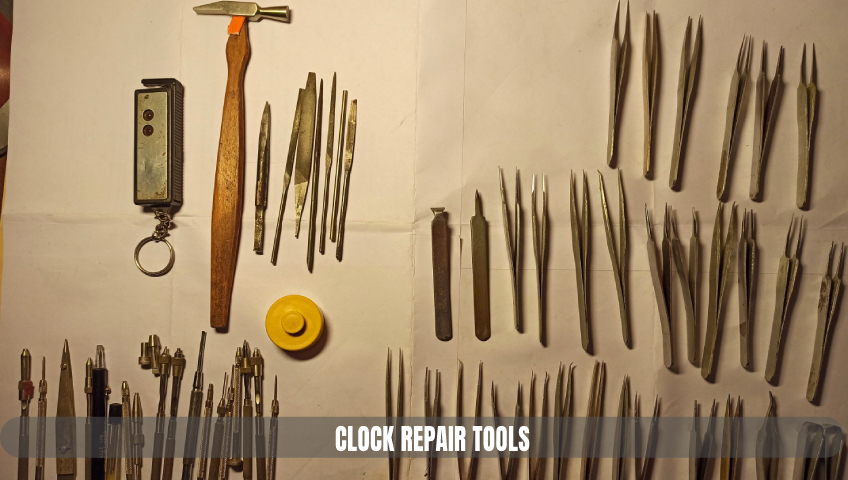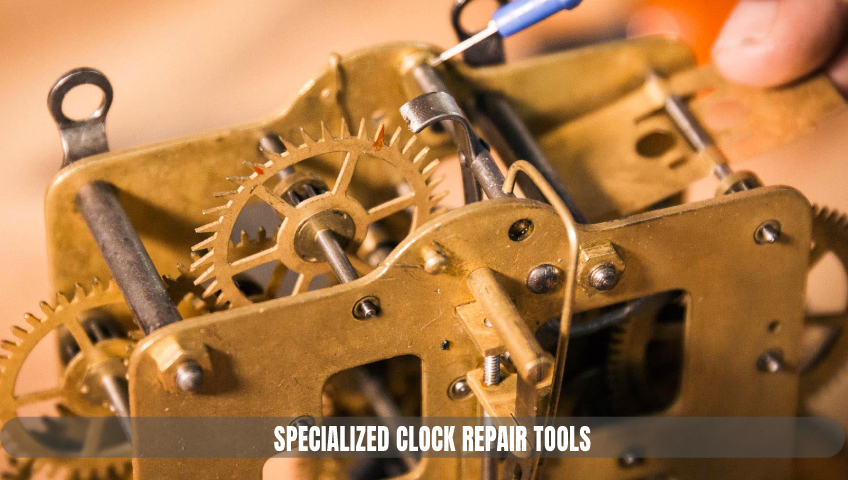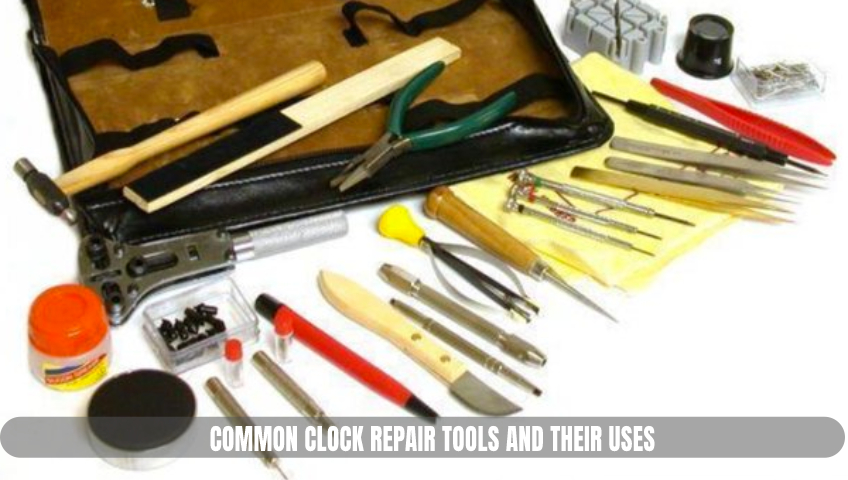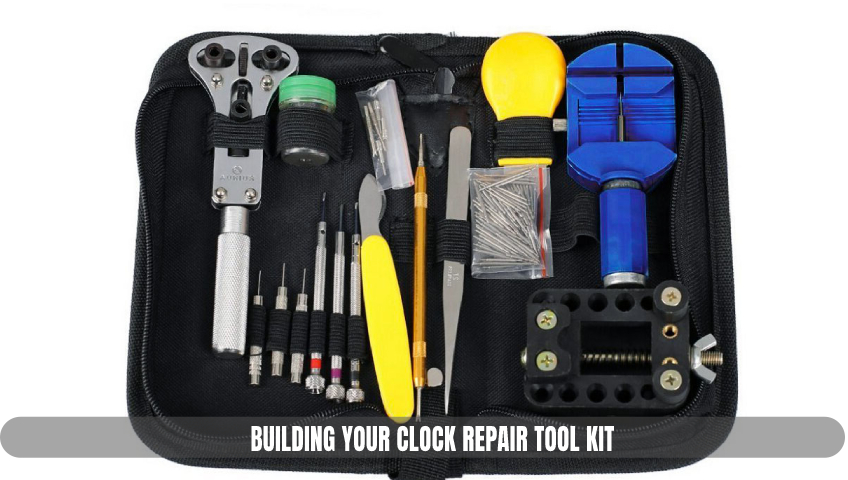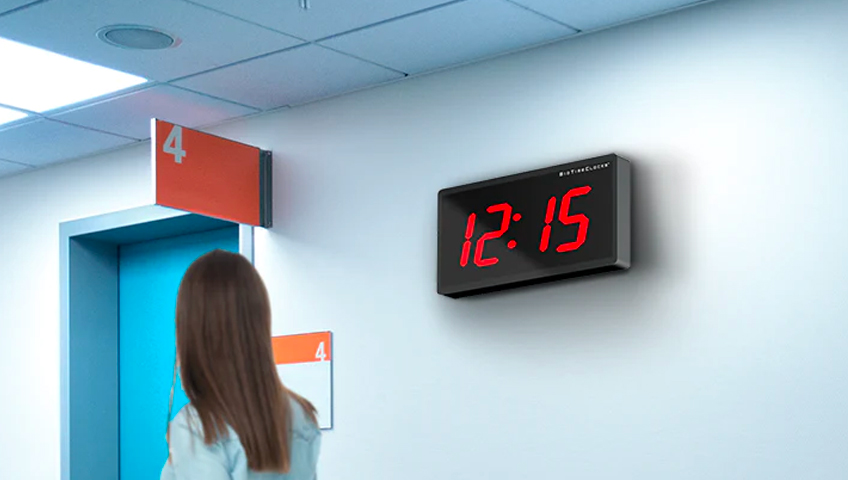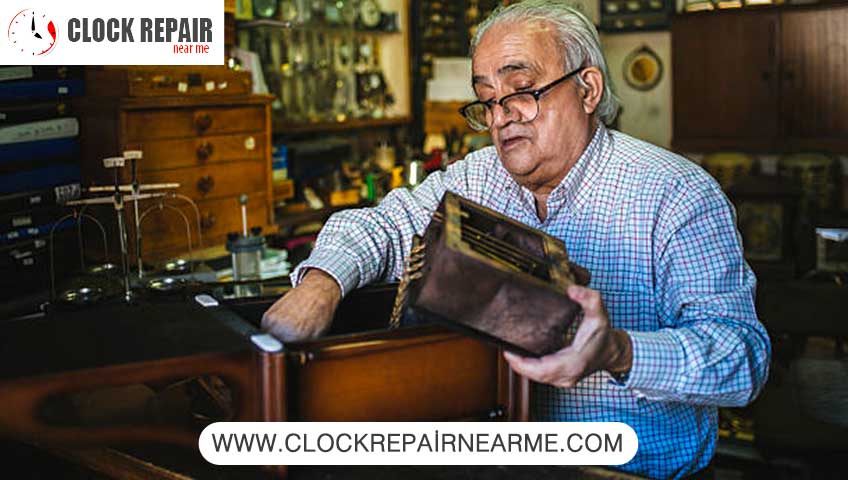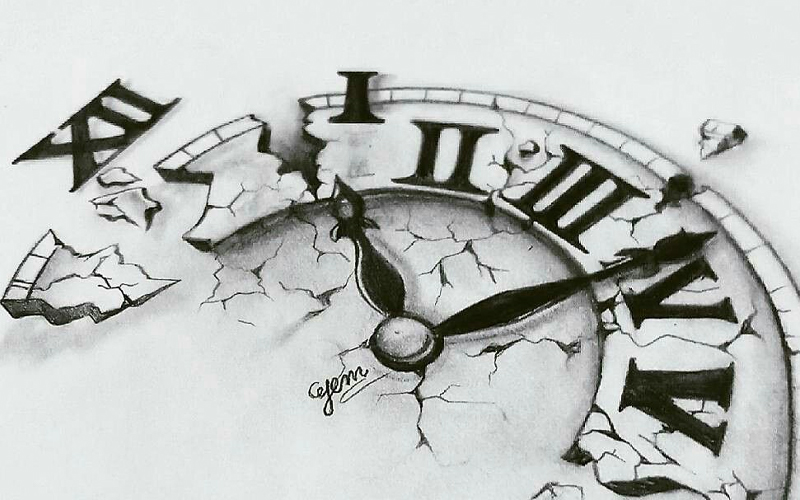If you’re new to clock repair or looking to expand your toolbox, here are the essential clock repair tools you need. As a clock enthusiast, there’s nothing more frustrating than when your beloved timepiece stops ticking. In such situations, having the right tools to repair it can be a lifesaver.
Screwdrivers are a must-have for any clock repair enthusiast. When it comes to clock repair near me, precision is key, and screwdrivers of different sizes and shapes come in handy for removing and tightening screws on various parts of the clock.
Pliers are another crucial tool for clock repair. They’re useful for holding small parts in place while you work on other parts. It’s best to have both needle-nose and flat-nose pliers in your toolbox.
Tweezers are ideal for handling very small parts in tight spaces. Having a few different sets of tweezers with varying tips will help you tackle even the most intricate clock repairs.
Cleaning solutions are necessary for removing dirt, grime, and oil buildup from the clock’s inner workings. Some popular cleaning solutions include naphtha, alcohol, and ultrasonic cleaners.
Adding lubrication to the clock’s moving parts helps reduce friction, which can cause wear and tear over time. Popular lubricants for clock repair include synthetic oils and greases.
A magnifying glass or loupe can help you see small details that the naked eye might miss. With a magnifying glass, you can examine small parts, markings, and serial numbers with ease.
In conclusion, having the right clock repair tools is vital to ensure your timepieces continue to tick smoothly. This list provides a great starting point for building your toolkit and tackling repairs with confidence. Remember to take good care of your tools so that they last a long time and continue to serve you well. Happy tinker
Specialized Clock Repair Tools
An antique clock is a beautiful piece of art, and it requires special care to keep it running like new. However, when your clock stops working, the last thing you want to do is take it to a repair shop. With specialized clock repair tools, you can fix most clock issues in the comfort of your own home. One of the most important tools for repairing clocks is a set of screwdrivers. Clocks have small screws that require precision screwdrivers to remove. Using the wrong size or type of screwdriver can damage the screws or the clock’s delicate parts.
Another crucial tool for clock repair is a hand puller. This tool is used to safely remove clock hands without damaging them or the clock face. Hand pullers are available in different sizes to accommodate various types of clocks. Clock oil is another essential tool for maintaining a clock’s movement. It helps reduce friction between the moving parts, preventing wear and tear that can cause the clock to stop working. Different types of clock oil are available depending on the clock’s movement type.
A mainspring winder is another specialized tool used in clock repair. It helps wind the springs that power the clock’s movement. Mainspring winders come in different sizes to fit various clock movements. A bushing tool is also important for repairing worn-out clock bushings. Bushings are small metal tubes that support the clock’s moving parts. Over time, they can become worn out and need to be replaced. A bushing tool ensures that the new bushings fit perfectly, allowing the clock to run smoothly.
In conclusion, specialized clock repair tools are essential for anyone who wants to repair their clock at home. With the right tools, you can fix most clock issues without having to take it to a repair shop. So, invest in the right tools, and enjoy your clock for years to come.
The Importance of Quality Clock Repair Tools
Clocks are essential timekeeping devices that people rely on every day. But have you ever wondered what makes a clock tick so precisely and accurately? The answer lies in the quality of its parts and the tools used to repair and maintain them. Clock repair is a delicate task that requires specialized tools designed for the job. These tools are essential for ensuring that clocks remain accurate and functional for years to come. When it comes to repairing clocks, using high-quality tools is crucial for achieving optimal results. One of the most important tools in a clock repair kit is the screwdriver. Clock screws are tiny and require a precision screwdriver to remove and replace them properly. Using low-quality screwdrivers can lead to stripped screws or damage to the clock’s delicate parts. Investing in quality screwdrivers can save time, effort, and money in the long run.
Another critical tool in clock repair is the mainspring winder. This tool is used to wind the mainspring, which provides power to the clock’s movement. Using a low-quality or incorrect size mainspring winder can cause damage to the mainspring or the clock’s movement, leading to inaccurate timekeeping or even complete failure. Other essential tools for clock repair include tweezers, pliers, files, and oilers. Each tool has a specific purpose and must be of high quality to ensure proper functionality. Precision and accuracy are paramount when working with clocks, and investing in quality tools is an investment in the clock’s longevity. In conclusion, quality clock repair tools are vital for maintaining and repairing clocks accurately. Cheap and low-quality tools may seem like a cost-effective solution initially, but they can lead to costly mistakes in the long run. Investing in quality tools ensures that clocks remain accurate and functional for many years to come. So, whether you’re a professional clockmaker or a hobbyist, make sure to invest in the best quality tools for your clock repair needs.
Common Clock Repair Tools and Their Uses
Clocks, whether they are antique or modern, require maintenance and repair to keep them working properly. And for that, you need the right tools. In this article, we’ll explore some common clock repair tools and their uses.
- Screwdrivers: A set of good quality screwdrivers is essential for clock repair. You’ll need flathead and Phillips head screwdrivers in various sizes to fit different screws found in clocks. You should also have a precision screwdriver set, which includes tiny screwdrivers for delicate clock parts.
- Pliers: Pliers are needed to hold small parts in place while working on the clock. They come in handy when handling tiny springs and wires that are difficult to grip with fingers. A pair of needle-nose pliers is a must-have in your clock repair toolkit.
- Tweezers: Tweezers are an essential tool for any clock repair. They help in handling small and delicate clock parts with precision, especially when placing gears, pins, and springs back into place.
- Movement Holder: This tool holds the clock movement securely in place while you work on it, preventing damage to the movement. It is especially helpful when repairing movements in large clocks.
- Oil and Grease: Clocks require lubrication to function properly. Watchmakers use oil and grease to lubricate moving parts and reduce friction between them. Be sure to use the correct type of oil and grease recommended by the manufacturer.
- Cleaning Solution: Over time, clocks accumulate dust and dirt, affecting their performance. Cleaning the clock’s parts with a specialized cleaning solution can help restore its accuracy. Be careful not to use any harsh chemicals that might damage the clock.
In conclusion, repairing a clock requires specialized tools, and having the right ones in your toolkit makes all the difference. Investing in high-quality clock repair tools will not only make the job easier but also ensure that the clock works accurately for years to come.
Advanced Clock Repair Tools and Techniques
Clocks have been around for centuries and continue to be a popular time-telling device. However, like any other mechanical device, clocks can experience wear and tear over time. As a result, they may require repair or maintenance to function efficiently. In this article, we will discuss advanced clock repair tools and techniques that are commonly used by professional clock repair experts. One of the essential tools in clock repair is a set of screwdrivers. Clocks are intricate machines with several small screws and pins that need to be adjusted and tightened to ensure proper function. Clock repair experts use specialized screwdrivers with thin heads to access these tiny parts without damaging them. Additionally, precision tweezers are also used to manipulate small parts within the clock mechanism.
Another important tool used in clock repair is the balance staff remover. This tool is used to remove the balance staff from its pivot holes, allowing repair experts to clean and lubricate the clock’s critical components. A mainspring winder is another essential tool used in clock repair to wind the clock’s mainspring without causing damage. When repairing antique clocks, it is essential to have specialized tools such as bushing tools, pivot polishers, and staking sets. These tools are used to repair worn-out pivot holes, replace missing gear teeth, and polish rough pivots.
In addition to these tools, advanced clock repair techniques such as ultrasonic cleaning, electroplating, and laser welding are also used. Ultrasonic cleaning involves using high-frequency sound waves to remove dirt and grime from the clock’s intricate parts. Electroplating is used to restore the original finish on clock casings and dials, while laser welding is used to repair damaged metal parts. In conclusion, clock repair requires specific tools and techniques that are best left to professionals. With proper care and maintenance, clocks can function efficiently for many years. If you own an antique or vintage clock, it is advisable to have it serviced by a professional clock repair expert who has the advanced tools and techniques required to restore it to its former glory.
Building Your Clock Repair Tool Kit
Clock repair can be a rewarding hobby that allows you to preserve and restore beautiful timepieces. However, to do this, you will need the right tools to get started. Assembling a comprehensive tool kit can take some time and effort, especially if you are just starting out. In this article, we will explore the essential tools needed to build your clock repair tool kit. The first tool you should invest in is a good set of screwdrivers. A set with interchangeable tips in various sizes is ideal, as it will allow you to handle a wide range of screws found in clocks. Next, you will need a pair of needle-nose pliers. These are useful for holding small parts that are difficult to grip and removing stubborn pins.
A spring bar tool is also essential for removing watch bands, and the same tool can be used for removing bezels on clocks. A set of tweezers with pointed tips is another necessary item. These will help you manipulate small parts, such as gears and springs, with precision and accuracy. Other useful items to include in your clock repair tool kit are a magnifying glass or loupe, oilers, a mainspring winder, and a bench vise. A quality oiler will ensure that the lubricants are applied precisely where they are needed, while a mainspring winder will save you time when winding springs.
Lastly, a bench vise is a must-have item for any serious clock repair enthusiast. It securely holds the clock in place, allowing you to work on it without fear of damaging it. Look for a vise with soft jaws that won’t scratch or mar the clock’s surface. In conclusion, building a clock repair tool kit requires patience and research, but investing in quality tools will make a significant difference in the outcome of your clock repairs. By starting with the essential tools mentioned above and gradually adding to your tool collection, you will be on the way to becoming a skilled clock repair expert in no time.
Tips for Choosing the Right Clock Repair Tools
Clocks are an essential part of our daily lives, and when they break down, they can be a real nuisance. But fear not! With the right clock repair tools, you can fix your clock in no time. Here are some tips for choosing the right clock repair tools:
- Identify the type of clock: Before purchasing any tools, it’s important to know the type of clock you have. Different clocks require different tools, so make sure you do your research before making any purchases.
- Look for quality: When it comes to clock repair tools, it’s always better to invest in high-quality tools that will last a long time. Cheap tools may seem like a good idea at first, but they can wear out quickly and cause damage to your clock.
- Consider the size of the clock: Clocks come in all shapes and sizes, so it’s important to choose tools that are appropriate for the size of your clock. For smaller clocks, you’ll need smaller tools, while larger clocks will require larger tools.
- Choose tools with interchangeable parts: Clock repair can be complicated, and having tools with interchangeable parts can make the process much easier. Look for tools with removable heads or interchangeable bits to make your job easier.
- Invest in a good set of screwdrivers: Screwdrivers are an essential tool for clock repair, so it’s important to invest in a good set of screwdrivers. Look for screwdrivers with comfortable handles and tips that fit snugly into the screws on your clock.
- Don’t forget about lubricants: Lubricants are important for keeping your clock running smoothly, so make sure you have the right lubricant for your clock. Be sure to use the recommended amount and apply it in the right places.
In conclusion, choosing the right clock repair tools is essential for maintaining your clock’s longevity and accuracy. By following these tips, you can ensure that you have the right tools for the job and keep your clock ticking for years to come.

